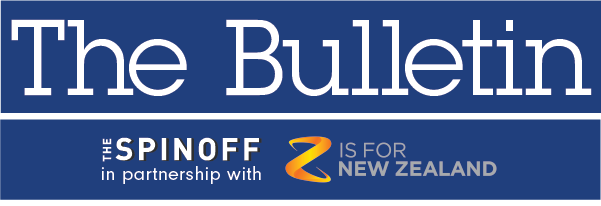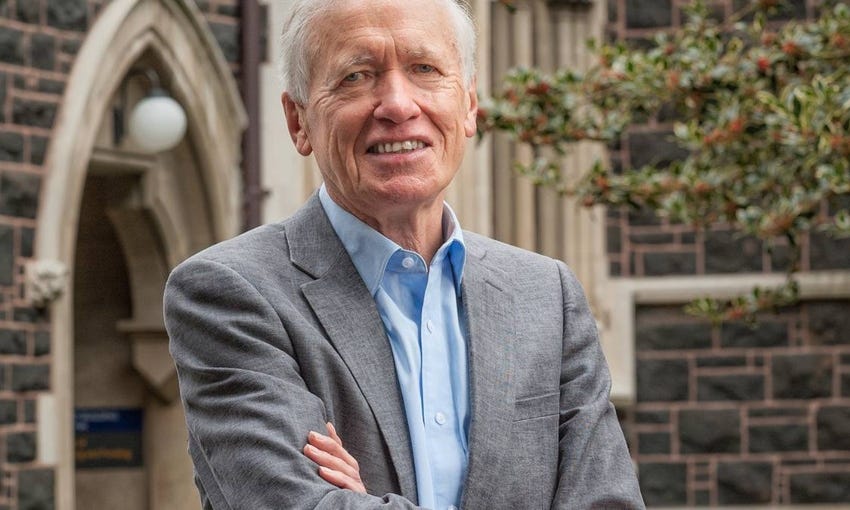Eight key points of Skegg report on reopening
A major new report came out this morning about the borders, and whether the elimination strategy should continue
Good morning and welcome to The Bulletin for Wednesday 11 August, by Alex Braae for The Spinoff. Presented in partnership with Z Energy.
In today’s edition: Eight key points of Skegg report on reopening, two stories show difficulties of implementing climate policy, and minister opts not to toll road north of Auckland.
Image: Report chair Sir David Skegg (Supplied)
A major new report came out this morning on how New Zealand's borders might reopen, and whether the elimination strategy should continue. It came from a group chaired by Sir David Skegg, and included a range of economic and public health advisors. The report was commissioned by the government, and is intended to form the backdrop to discussions about the strategy from here. Here's eight key points.
The report backed the use of elimination to date. Elimination had allowed much of cultural, economic and social life continue over the last eighteen months, in contrast to other countries that have bounced in and out.
It may not necessarily continue, though it is argued to be viable even with phased reopening of borders. To quote: "There are two reasons why it is timely to review the case for holding to an elimination strategy. One is the advent of safe vaccines that have been shown to have high efficacy (in clinical trials) and effectiveness (in national programmes). The other is that there are calls to start re-opening our borders to travellers other than citizens and residents, and to allow more quarantine-free entry."
Continued elimination is encouraged to "keep our options open". If Covid was allowed to take hold, the report authors see that as irreversible. They don't see that as meaning no cases whatsoever – rather any clusters are quickly clamped down on. Even with vaccinations, the consequences of an outbreak like the one seen in New South Wales are regarded as severe. Something like that happening in New Zealand this year was considered possible.
The report recommended a new name for the strategy. Other countries have gone with "aggressive containment". The report recommended a name for the strategy be taken from te reo Māori.
Vaccine data to date is showing promise. However, that is hindered by several factors. New Zealand's rate of vaccination remains low, making an outbreak more dangerous. And new strains that test vaccine effectiveness are developing, particularly through natural selection of the virus in partially vaccinated populations.
International travel could resume, but only under bubble-like conditions. Those include being from approved countries, doing pre-departure tests, and tests on arrival. It's not strongly different from the settings around Australia, though that bubble is burst for the foreseeable future. The report also sees "at least six months to prepare for reducing border restrictions, because considerable preparatory work is required." It also recommends, at some hypothetical stage in the future, an opening for fully vaccinated New Zealanders going overseas on short trips without quarantine, under conditions.
But when would any of this actually start? Largely that hasn't been firmly stated in the report, with a note near the end that "it is unrealistic for some commentators to be demanding firm plans for re-opening, long in advance." That comes in a section called "Considerations for 2022", if that helps date it. If the report is followed, the current border conditions will persist for many months to come.
What is the government's view? A reminder – this report is the view of the authors, not necessarily the government. Their response will be given at the Reconnecting New Zealand forum, to be held on Thursday. It is fair to say the report has taken a generally cautious line on those questions, which could have implications for the response.
Two stories about climate change policy that show how difficult it will be to make progress: Farmers Weekly has reported on a survey that shows the most widely held concern of farmers is now climate change policy – note, that is not the effect of climate change but rather the plans to address emissions. And Radio NZ's Jordan Bond reports on the booming share of the country's emissions being driven by private transport – in other words, people are buying bigger cars and driving more.
And a story about action going the other way: Late last week One News reported a coalition of groups are suing Auckland Council and AT over their transport plan, which the activists say does not match their legal responsibilities to reduce emissions. It's a comment from the other end of the North Island on a semi-related story, but this quote from Wellington councillor Tamatha Paul in a Radio NZ article is relevant to the wider question of individual vs systemic actions to reduce emissions: "This government has not done enough to enable you to make the changes and live the lifestyle that we need to live."
And in another story that is semi-related to climate change, transport minister Michael Wood has opted not to put a toll on the new motorway between Pūhoi and Warkworth north of Auckland. The NZ Herald reports his decision was based in part on heavily negative local feedback. Motorists might also have been double-tolled, because of the tunnel around Silverdale. And after all, it's no good tolling a road if there are no good public alternatives – that's just punitive revenue gathering. On that point, people not wanting to drive from Warkworth down to the CBD should look into the Mahu City Express bus line.
Every dollar our members contribute directly funds our editorial team and is devoted to ensuring we do more. Support the team. Donate today!
So what on earth happened to the electricity on Monday night? A few theories have been floated. The government has put it down to "market failure", reports Justin Giovannetti, with a third coal/gas boiler not being turned on at Huntly despite Transpower forecasting high demand. Minister Megan Woods also apologised to those cut off. But as the NZ Herald's (paywalled) Hamish Rutherford argues, the signs have been coming for a while of a system at capacity, with several industrial users going idle in particular.
Eleven nurses resigned from Wellington hospital's emergency department in the space of a fortnight, according to their union. The NZ Herald's Sophie Trigger reports it comes amid complaints of overcrowding and understaffing, and it appears the resignations came on top of existing vacancies. The resignations represent about 10% of the department's nursing workforce. It comes amid the context of the upcoming strikes, which seem to be motivated as much by work conditions as they are pay. Meanwhile, this is an alarming look at what ICU capacity actually means, from an expert published on Stuff.
The surprise end to litigation in the James Hardie class action is prompting calls for law changes to how these sorts of cases are funded. Stuff's Rob Stock reports it came because the London-based funders lost confidence the case could be won, and so they cut their losses. It's a complicated issue the Law Commission is currently looking at, because on the one hand external funding could be seen to undermine the integrity of a case, but on the other hand seeking justice can be eye-wateringly expensive.
Got some feedback about The Bulletin, or anything in the news?
Get in touch with me at thebulletin@thespinoff.co.nz
Right now on The Spinoff: Danyl Mclauchlan speaks to Eliot Higgins of open source sleuth website Bellingcat, ahead of his Word Christchurch appearance. Mirjam Guesgen writes about the scientific advances that went into the latest climate report. Alice Webb-Liddall, in partnership with Otago University, writes about efforts to hold vaccination events for Māori on their own marae in rural Canterbury. Fiona Hurd and Suzette Dyer write about the problem of relying on HR departments to address toxic work cultures.
And a more formal welcome to Chris Schulz to the team: You might have noticed he's put out a few buzzy entertainment and society stories recently, but as of this week the former Herald journo is our new features editor. To celebrate this very good get, here's two more stories from Chris: The first is about Taika Waititi's new TV show being celebrated in the US, but unable to be watched in NZ. And the second is an amazing dive into TV show The Project, which has now spent years trying to take down Seven Sharp in the coveted 7pm slot.
For a feature today, a troubling story about the slow murder of a vitally important waterway and ecosystem for the world. The Sea of Marmara was once home to abundant marine life, and sustained numerous towns and cities around it. But as this piece on Eurozine laments, reckless policy has done terrible damage, which may not now be reversible. Here's an excerpt:
The real problem was the swift industrialization around the Golden Horn as factories on its shores pumped toxic waste into its waters. I recall how, over the 1980s, we used to roll up our car windows to avoid the area’s awful odor: a mixture of shit and rotten eggs. The local government invented a project to cleanse Golden Horn which paved the way for our current mucilage crisis. Istanbul’s blue-eyed mayor, Bedrettin Dalan, promised to ‘turn the Golden Horn’s shade to my eye colour.’ A World Bank-funded project was set to become the world’s largest wastewater treatment facility. Located in Istanbul’s Baltalimanı, it would process all the home waste from Istanbul’s Asian side.
Instead, authorities opted for a technique known as deep-sea wastewater discharge. It repurposed the stream leading to the Black Sea as a conveyer belt, which they hoped would push the Golden Horn’s dirt into the Black Sea. A component of the ‘Istanbul canalization project,’ the technique continued under the right-wing Dalan’s social democrat successor Nurettin Sözen, who rose to power in 1989. (When Recep Tayyip Erdoğan became Istanbul’s mayor in 1994, he sustained the project which remains in place to this day.)
The All Blacks could be facing a fair few empty seats when they play Australia again this weekend. The NZ Herald's (paywalled) Gregor Paul writes that sales have been slow for the repeat fixture at Eden Park, and that reflects several trends. But a big one is that the All Blacks as an entertainment product are now competing not just against other live events, but against the world of streaming content generally – especially on a cold winter's night in a stadium with pricey beer.
And we're all hoping for the best on this one: Former NZ cricketer Chris Cairns is currently on life support in a hospital in Australia, reports Newshub. It follows a medical event and several operations.
That's it for The Bulletin. If you want to support the work we do at The Spinoff, please check out our membership programme.






